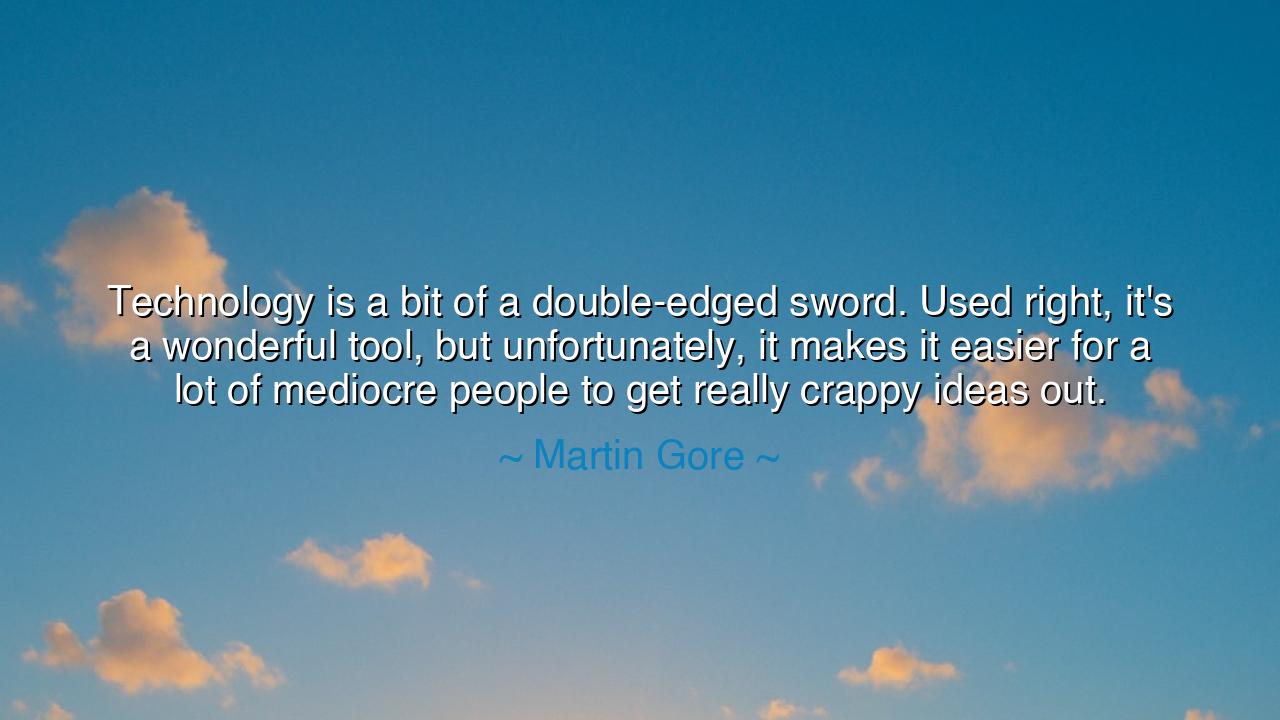
Technology is a bit of a double-edged sword. Used right, it's a
Technology is a bit of a double-edged sword. Used right, it's a wonderful tool, but unfortunately, it makes it easier for a lot of mediocre people to get really crappy ideas out.






Hear now the voice of Martin Gore, who, like a prophet gazing upon the shifting landscape of human invention, declared: “Technology is a bit of a double-edged sword. Used right, it’s a wonderful tool, but unfortunately, it makes it easier for a lot of mediocre people to get really crappy ideas out.” In these words lies not scorn alone, but warning and wisdom. For every tool forged by the hand of man carries within it both the power to build and the power to destroy. The fire that warms the hearth may also burn down the village; the sword that guards the innocent may also spill innocent blood. So it is with technology—bright with promise, yet shadowed by peril.
The ancients too understood this paradox, though they spoke not of circuits and screens but of weapons and words. The Roman historian once observed that luxury, born from the abundance of empire, bred weakness in its people. In like manner, technology, when wielded without discipline, may cheapen effort, allowing the shallow voice to shout as loudly as the wise, drowning truth in a sea of noise. Thus Gore’s words remind us: the value of a creation is not guaranteed by the ease of its making, for what is easy to birth is not always worthy to endure.
Consider, O listener, the story of the printing press, the marvel of Gutenberg that changed the fate of nations. With it came the spread of holy scriptures, the democratization of knowledge, the uplifting of the common soul. But with it also came pamphlets of slander, the wild cries of rumor and falsehood that set neighbor against neighbor. Here we see clearly the double-edged sword: a tool of liberation, yet also a channel for folly. It was not the press itself that erred, but the hearts and hands of those who chose to wield it without wisdom.
So too in our own age, the Internet has become both temple and tavern, sanctuary and marketplace of chaos. A single keystroke may share a cure, or spread a lie. A child in a remote village may learn the wisdom of the stars, while another mind drowns in the flood of triviality. This is what Gore lamented: that mediocrity, once confined to whispers in small rooms, can now echo across the world in an instant, cloaked in the same garments of power as the noblest thoughts. The sword cuts both ways, and the careless hand is as dangerous as the malicious one.
Yet do not despair, for the same blade that wounds can also defend. When wielded with honor, technology becomes the chariot of progress, carrying medicine to the sick, art to the hungry spirit, and knowledge to those long denied. The heroes of our age are not only soldiers, but also coders, inventors, and teachers who wield this tool with courage and foresight. They remind us that the worth of a tool is judged not by its existence, but by the character of its master.
What then is the lesson, O children of tomorrow? It is this: do not be seduced by the ease of creation. Strive for excellence even when the path is hard, for the world has no need of more empty noise. Let your words, your works, your inventions be born not of haste, but of thought, discipline, and care. For though anyone may now wield the sword of technology, not all who hold it are worthy of it.
Therefore, take up this counsel as your guide: Before you release an idea into the world, ask if it serves truth, beauty, or the good of mankind. Sharpen your mind before you sharpen your tools. Guard against mediocrity, and refuse to let the gift of progress become a channel for folly. Use the sword, but wield it with reverence, for in your hands it can carve monuments that endure—or shadows that consume.
And remember this always: the future is not shaped by technology itself, but by the wisdom and virtue of those who dare to wield it.






AAdministratorAdministrator
Welcome, honored guests. Please leave a comment, we will respond soon